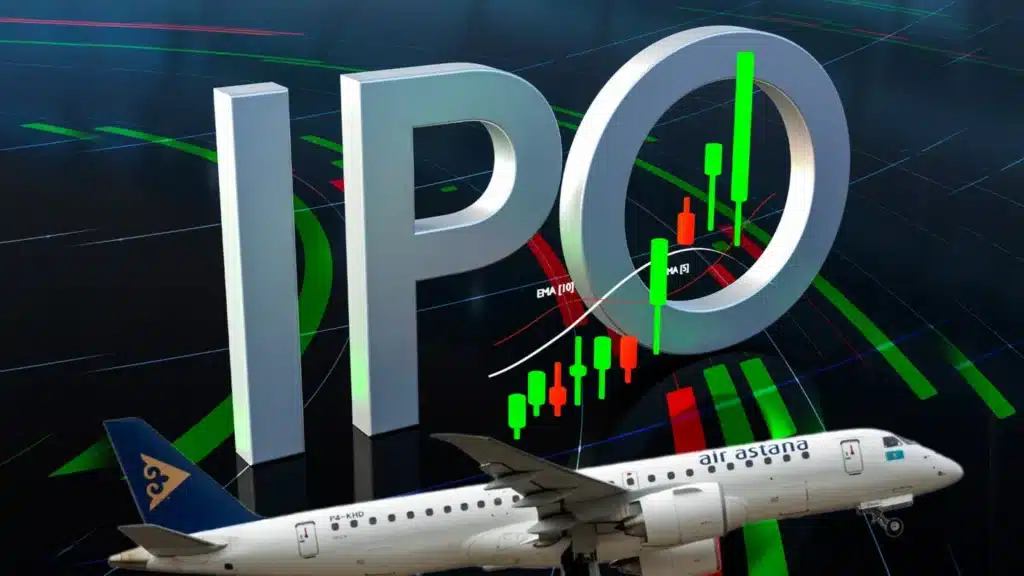Peter Foster bets on fair evaluation of Air Astana from the stock market

Since the initial public offering (IPO), Air Astana shares have lost nearly 30% of their value (from $2.49 to $1.74). However, analysts and the National Bank of Kazakhstan recommend buying the stock, forecasting a potential price increase of up to 50%. During an interview with Kursiv, CEO of the airline Peter Forster expressed hope that the stock price of the company would align with its strong performance.
As Foster noted, the current stock price does not reflect the airline’s performance, which has been very strong, as confirmed by both local and foreign analysts.
«This is an airline that not only has 23 years of high performance but also has tremendous prospects. We are highly efficient and operate in one of the fastest-growing regions in the world. Analysts have already made positive assessments of our performance and we just hope that the stock price will follow. You know, we are not market makers or stock brokers. All we can do is manage this airline in the most efficient and dynamic way possible. We believe that if we continue to manage the airline in an efficient, dynamic, and creative manner, the stock price will reflect this as it does for any other company,» Forster highlighted.
The airline’s CEO also pointed out the economic growth prospects in Central Asia. He is confident that the company’s market value will eventually reflect this situation.
In February 2024, Air Astana went public, raising $120 million. The market had anticipated this move since 2011. The total amount of the IPO was $370 million, with an option for additional offerings and sales of shares controlled by existing shareholders. The listing was also supported by pension funds from the Unified Accumulative Pension Fund (UAPF) and managed by the National Bank ($50.2 million), Halyk Finance ($729,113), Jusan Invest ($268,179), BCC Invest ($199,039) and Halyk Marker Global ($146,660).
With an offering price of $2.25, the company’s share value rose to $2.51 within the first few days of trading, but it began declining. According to KASE, from February 15 to late April, the share value of Air Astana dropped by a quarter.
Additionally, the company had planned a buyback of its shares before the IPO. The program was launched 2.5 months after the listing. The company bought back about 4.78 million of its shares and global depository receipts (about 1.3% of the overall stock). The buyback was designed to be part of an employee incentive program. However, it didn’t help much. From April 29 to May 3, the airline’s share price rose slightly from $1.89 to $2.08 (+9.6%). Then the price started to fall once again. As of August 5, one Air Astana share was valued at $1.74.
Despite the decline in the airline’s share price, investment managers expect the price to grow. In March, Freedom Broker predicted a 51% increase in the Air Astana share price and GDR price to $3.35 and $14.10, respectively, advising investors to buy them. At the time, analysts took a cue from the airline’s growing operational and financial results over the past several years. In its May survey, Freedom Broker estimated the stock’s growth potential at 44%, based on the financial statement by Air Astana for the first quarter of 2024.
Head of the National Bank of Kazakhstan Timur Suleimenov also has faith in the high growth potential of Air Astana stock, despite its gradual decline since the IPO. He stated that the situation won’t affect the revenue of the UAPF, which acquired the stock in February.
According to Alina Aldambergen, head of KASE, investors often opt to buy other stocks if their initial investment doesn’t perform well, driving the price of that stock down further. This is what has happened to Air Astana, she said.
In the first half of 2024, Air Astana reported a 12.9% increase in its consolidated revenue. At the same time, the airline’s net profit plunged fivefold from $23.5 million to $4.6 million. In the first quarter, the company reported $10.8 million in losses compared to $886,250 in profit over the same period last year. The airline’s profit dropped by 28.3% in the second quarter to $16.2 million. As of April 1, the company was controlled by Samruk-Kazyna (41%), Citibank (23.6%, the nominal holder), BAE Systems (16.98%), and the UAPF (6.52%).

